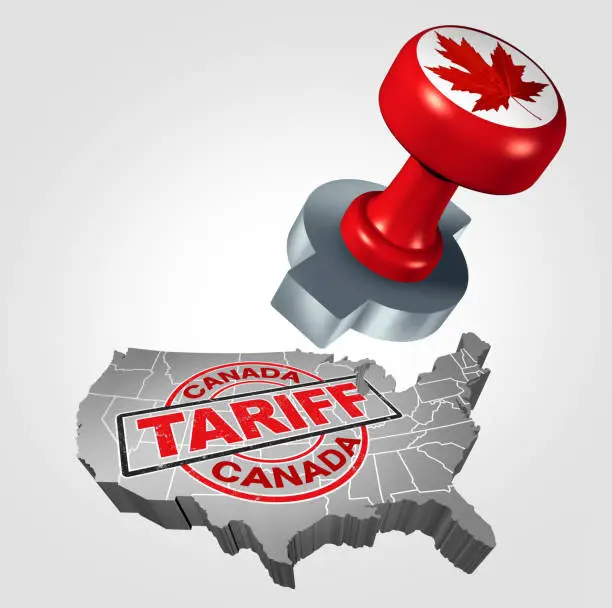
Trump’s Tariffs Are Stirring the Pot—Here’s How It Could Hit Your Mortgage in Canada
Trump’s tariff headlines are back—and so is the market chaos. From rising bond yields to unpredictable BoC decisions, Canadian mortgage rates are once again in the spotlight. If you’re planning to buy, renew, or refinance, now’s the time to pay attention.
Tariffs, Trade Wars, and Your Mortgage: Why You Should Care
When you hear “tariffs” and “trade wars,” your first thought probably isn’t about your mortgage payments—but maybe it should be. With rising tensions between the U.S. and its trading partners, including Canada, the ripple effects are beginning to show up in some very personal places: your borrowing power, your mortgage rate, and even your ability to qualify for a loan.
If former President Donald Trump returns to power and reintroduces sweeping tariffs, Canadian homeowners and homebuyers could face a domino effect of economic consequences—starting as early as February 2025. So let’s break it down: what’s really at stake, and how can you protect your finances?
How Do Tariffs Affect Canadian Mortgage Rates?
At first glance, tariffs seem like a foreign policy issue. But in reality, they can send shockwaves through the economy. Here’s how they could influence your mortgage:
1. Tariffs Could Fuel Inflation
When import costs go up (thanks to new tariffs), the prices of everyday goods—from cars to groceries—start to climb. That’s inflation. And inflation is public enemy number one for the Bank of Canada. When inflation spikes, the Bank often reacts by raising interest rates to slow it down.
If that happens, anyone with a variable-rate mortgage could see their payments jump. And if you’re shopping for a mortgage now, fixed rates could also be higher than expected as lenders build in future risk.
👉 Oxford Economics predicts that retaliatory tariffs could push inflation up to 7.2% and shrink Canada’s GDP by 2.5% by early 2026. That’s no small thing.
2. Stricter Lending Could Make Mortgages Harder to Qualify For
When markets get jittery, lenders tighten their belts. Expect:
- Higher credit score requirements
- Larger minimum down payments
- More paperwork and documentation to prove your financial stability
If you’re self-employed, recently changed jobs, or have a lower credit score, it could become harder to get approved—even if interest rates stay the same.
To stay ahead, getting pre-approved now or working with a broker can help you find more flexible products before the rules get stricter.
3. Housing Affordability Could Take a Hit
Let’s be honest—buying a home in Canada is already a stretch for many. But if borrowing costs rise due to tariffs, inflation, and interest rate hikes, affordability will suffer even more.
If you already own a home, you might face payment shock at renewal—especially if your current rate was locked in at the historic lows of 2020–2021. Roughly 1.2 million mortgages are set to renew in 2025, many of which were fixed at rates below 2.5%. Facing today’s higher rates (5–6%+), monthly payments could increase by hundreds of dollars.
Planning ahead—through early renewal, refinancing, or extending your amortization—can soften the blow.
Should You Choose a Fixed or Variable Mortgage Now?
It’s the question we all ask in uncertain times: should I lock in my rate or take a chance with a variable?
Fixed-Rate Mortgage: A Safer Bet?
If you like peace of mind and predictability, fixed is likely your best friend right now. A fixed rate gives you a consistent payment, protecting you from any surprise hikes if tariffs drive up inflation and interest rates.
It’s perfect for people who:
- Have a tight monthly budget
- Are nearing retirement or already on a fixed income
- Plan to stay in their home for the full mortgage term
Variable-Rate Mortgage: Still Worth the Risk?
If you’ve got room in your budget and can stomach a little uncertainty, a variable rate might still work in your favour—especially if the BoC cuts rates again in response to a slowing economy.
This could be a good fit if:
- You’re expecting your income to grow
- You plan to break the mortgage early (since variable penalties are usually lower)
- You’re financially flexible and can absorb short-term increases
Bottom line: choose based on your lifestyle and risk comfort, not just what’s cheapest today.
How to Tariff-Proof Your Mortgage Strategy: 3 Practical Moves
If you’re concerned about where things are headed, here’s how to stay one step ahead:
✅ 1. Talk to a Mortgage Expert—Now
Even if you’re not buying or renewing immediately, a quick conversation with a broker can help you understand your options and lock in a strategy.
✅ 2. Lock in a Competitive Rate Early
Many lenders allow you to hold a rate for 90–120 days, and some (like Mortgage.Expert partners) can do more. That could save you thousands if rates jump before you’re ready to close.
✅ 3. Don’t Forget About Refinancing
If you’re sitting on some home equity, refinancing could help consolidate high-interest debt, extend your amortization, or lower your monthly payments. And if tariffs drive inflation higher, that breathing room could make a huge difference.
FAQs: Tariffs and Your Mortgage – What You Need to Know
Q: Will Trump’s tariffs really affect me in Canada?
Yes. As Canada’s largest trading partner, U.S. policy has a direct impact on our economy. Tariffs drive inflation, which affects BoC decisions and lender behavior.
Q: Are mortgage rates expected to rise in 2025?
Not guaranteed—but many economists expect at least short-term volatility. Fixed rates could edge up due to risk premiums even if bond yields drop.
Q: Is now a good time to refinance or renew early?
If you’re up for renewal in the next 12 months, it may be wise to explore early renewal or switching lenders to lock in a better deal before tariffs take hold.
As Trump turns up the heat on Asia with fresh tariffs, Canadian mortgage holders and homebuyers should brace for new economic shocks. Learn more in our breakdown of how these Asia-focused tariffs could impact Canada’s housing market.
Final Thoughts: Don’t Let Tariff Talk Catch You Off Guard
The global economy is shifting, and for Canadian borrowers, playing defence is smart strategy. Whether you’re buying, renewing, or refinancing, now is the time to build a plan that shields you from uncertainty.
You don’t have to guess your way through this. With the right advice and tools, you can navigate even the most unpredictable markets confidently.
Why Choose Mortgage.Expert?
At Mortgage.Expert, we do more than quote rates—we craft strategies. Our licensed mortgage experts help you:
- Lock in low rates before they rise
- Understand fixed vs. variable pros and cons
- Get pre-approved with ease, even in a tightening market
- Refinance to access equity or reduce payments
No sales pressure. No commissions. Just real advice for real Canadians.
Stuck with a Mortgage Decision?
Don’t stress — our team is here to help. Reach out for free, no-obligation guidance.
Contact the Experts



